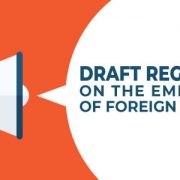Archive for year: 2019
White Paper On The Repositioning Of Home Affairs – Public Encouraged To Provide Comment
/in Archived, News /by xp-adminThe Department of Home Affairs released a Discussion Paper on its Repositioning for public comment in May 2017. The inputs informed the drafting of the White Paper that will provide the policy framework for drafting legislation that will define the mandate, role, status and obligations for Home Affairs in the future. This white paper is now available for public comment and discussion.
Click here to view the White Paper on Home Affairs.
Source: DHA
Draft Regulations on the Employment of Foreign Nationals
/in Archived, News /by xp-adminThe Draft Regulations (click here for a copy) include proposals affecting the applications of work visas, corporate visas and the submissions of skills transfer plans.
The Regulations centers around the protection of local labour by first seeking employers to exhaust the local labour market before looking at employing foreign nationals.
Where a foreign national is then approved where a citizen is not available, skills transfer is require in a monitored manner and requiring annual reporting.
The Draft Regulation notches up the requirements for work and corporate visas in the following areas:
- Requesting proof of registration with a Professional Body (before only needed for Critical Skills visas);
- Proof that 60% of total staff compliment employed are SA citizens or Permanent Residents (before only required for Business Visas and Corporate Visas);
- Additional requirements when advertising available positions;
- Legislated timelines of 10 days for the Department to provide feedback on suitable candidates from the ESSA system; and
- Reciprocally only allows companies 10 days for feedback on the candidates provided.
It further increases the involvement of Department of Labour by legislating the need for an annual skills transfer report submitted to the Department to monitor the skills transfer progress.
This provides an opportunity for industry leading Human Resource and mobility practitioners alike to help shape law.
Should you be interested in participating and providing your input, please contact Marisa Jacobs on marisa@xpatweb.com.
We will ensure a collated and sanitized formal submission is prepared and submitted to the Department and in the format, which has impacted previous law changes.
BizTrends 2019: Out with the old, in with the new!
/in Archived, News /by xp-adminThe White Paper on International Migration in South Africa released mid-2017 emphasised that the international migration policy was outdated and suggested a number of prominent changes to update the policy framework to align with the National Development Plan and more strategic application of immigration practices. We have seen some implementation of these strategic changes already, most noticeably in the latter part of 2018.
Herewith the top five strategic changes:
- The announcement of the new critical skills list due in April 2019
- The 10-year Business Visa for BRICS nations
- Visa free travel to South Africa for Kenya nationals
- Permanent Residency for students studying towards a Critical Skill
- Scrapping of the unabridged birth certificate for parents travelling with children
What will 2019 hold?
The highly anticipated new critical skills list
The Department is currently finalising its consultation process before implementing a revised critical skills list in April 2019. The new list will reflect an updated list of those occupations where demand outweigh supply and the Department of Home Affairs recognises these skills as critical for business and ultimately economic development in South Africa.
The 2018 survey on Critical Skills was recently completed by Xpatweb and over 100 responses from large corporates and multinationals were received. The survey focused on skills that local organisations find most challenging to recruit locally, and as a result expands their search internationally to recruit global talent. The survey comes just in time to provide input in terms of the review of the critical skills list.
The full results will be released later in November, but an initial analysis reveals that companies are still hard-pressed to find skills across a variety of occupations including engineering, C-suite executives, ICT occupations and health care professionals. Additional occupations that weren’t featured in last year’s survey include STEM teachers and lecturers, as well as specialist chefs and food technologists.
Increased investment and economic growth
On the back of changes such as the 10-year port of entry visas for BRICS business executives, visa-free travel for Kenya (with other African countries anticipated to follow) and scrapping of the unabridged birth certificate requirement for parent travelling with children, these changes pave a way for growth in the tourist sector as well as to attract business and investment to the country.
Other expected changes in 2019
- The visa requirements for highly skilled foreigners will be revised;
- The list of countries requiring visas for South Africa will be reviewed;
- Critical Skills Work Visas for foreign graduates who studied a critical skills area;
- Delinking of Permanent Residency and Citizenship through a points-based system; and
- Implementation of Section 8 of the Employment Services Act pertaining to the employment of foreign nationals
FIND US
Johannesburg
17 Eaton Avenue,
Bryanston, Johannesburg,
Gauteng, 2191
South Africa
George
55 York Street
Dormehls Drift
George, 6529
South Africa
CONTACT US
Telephone:
South Africa: 011 467 0810
Postal:
PO BOX 35046
Northcliff
2115
IN THE NEWS
- Another Positive Move To Attract More Tourists To SA
- Bringing in the Bomb Squad at Home Affairs
- How Home Affairs’ Immigration Reforms Could Drive SA’s Growth in 2025
- Phindiwe Mbhele on Remote Work Visa: Splendid Cape Town is wooing more and more digital nomads
- Cape Town Shines, and So Does South Africa’s New Critical Skills Visa Overhaul




